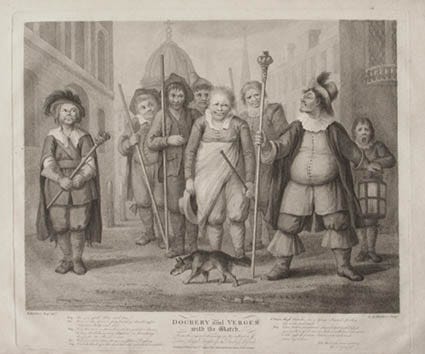Did Shakespeare chose not to think in Much Ado About Nothing?
what your wisdoms could not discover, these shallow fools have brought to light
UPDATE. The next Shakespeare meeting is ***Sunday 23rd June, 19.00 UK time*** (The original date was Fathers’ Day. Whoops!)
In Much Ado About Nothing, Shakespeare chose not to think very much. That was what the usually reliable A.D. Nuttall said in Shakespeare the Thinker. I disagree. In Much Ado About Nothing, Shakespeare shows us the triumph of determinism or the limits of rationalism—sometimes, thinking simply won’t help.
The title of this play has three meanings. Nothing, first, refers to the plot. Claudio thinks Hero was unfaithful, but he was deceived. So the hinge of the plot is something that didn’t happen. Second, nothing is slang for women’s genitals. Men have a thing, women have nothing. It’s not a tale about honour or virtue, as the characters believe; instead, they are all just chasing skirt. Third, nothing would have been pronounced more like “noting”, i.e. this is a play where everyone notes each other. It’s about gossip, eavesdropping, snooping. Nothing happens other than a lot of talk.
Take these three meanings together and you get a good sense of what this play is about: it isn’t that nothing happened, it’s that all that talk and gossip about what they think happened amounts to nothing very much.
All the characters think themselves clever or witty or virtuous. Benedict and Beatirce are very witty, but they have to be trick into realising (and admitting) that they love each other by the staged gossiping of their friends. Their cleverness has trapped them into a romantic stalemate. Claudio and the men think themselves honourable, but they are so easily deceived and roused to anger, at which point all honour vanishes as poor Hero is treated like dirt. And so it goes: Leonato and his status, Margaret and her barbs. None of them is actually able to make sense of the plot. None of them really knows what’s going on. It’s all hot air. It’s all nothing about nothing.
Compare all this busy nothing that thinks itself something to the wisdom of Cordelia. Lear asks her to pledge herself to him, following the example of her awful sisters.
what can you say to draw
A third more opulent than your sisters? Speak.Nothing, my lord.
Nothing!
Nothing.
Nothing will come of nothing: speak again.
Unhappy that I am, I cannot heave
My heart into my mouth: I love your majesty
According to my bond; nor more nor less.
If only some of the characters in Much Ado could face up to reality like this!
The plot is “solved” by an over-hearing. The idiots who belong to Dogberry’s watch overhear the equally dim conspirators who faked the scene that looked to Claudio like Hero being unfaithful. The whole plot is unravelled not by anyone’s wit or morals, but by an accident, the result of two idiots being idiotic. Be as clever as you like, Shakespeare is saying, events run along around you and all your efforts are as nothing.
In Romeo and Juliet, Shakespeare makes it clear that the determinism is not in the stars but in the society. The lovers are killed by misadventured piteous overthrows, by the neglect of their parents, the encouragement of the nurse and the friar, by the martial culture of their families, and by their own hot-headed behaviour, by Romeo’s death drive. The fault is not in our stars, as Shakespeare wrote in Julius Cesar, but in ourselves.
In Love’s Labour’s Lost the men try and defy the forces of love by setting up an academy, a plan that works well enough until the French princess and her ladies arrive. In Henry IV, Falstaff spends the whole play resisting everything that tries to tell him what to do, and he fails. And Much Ado About Nothing Shakespeare shows us how all the wit, manners, and morals in the world cannot work out the simplest (and in literary terms, one of the oldest) plot tricks in the book. The woman you saw at the window was in disguise.
When Borachio confesses to the deceit he tells Claudio that it was Dogberry and his men who, quite unwittingly, caught them out. It what could stand as a motto for the whole play, he says, “what your wisdoms could not discover, these shallow fools have brought to light.” Much Ado is not a play where Shakespeare chose not to think, instead it is a play where he shows us the limits of thinking and rationality.



I read Much Ado for the first time in 2017, when I was too green to comprehend any Shakespeare. I should try to reread the play. Thank you, Oliver, for this beautiful reminder!
Dear Henry,
you asked with which book of Murakami to start: I reccomend "The wind up bird chronicle". From there we can move on.